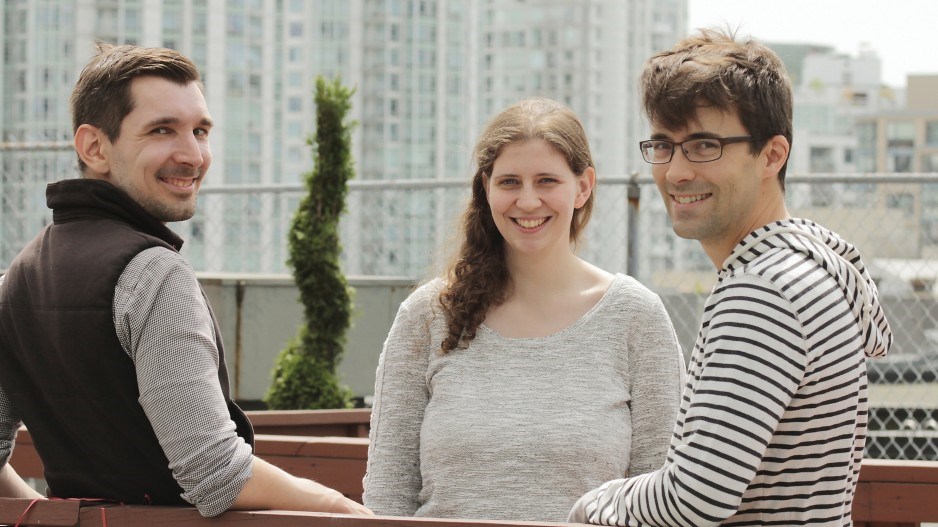Organizations across Surrey and Metro Vancouver are keying on two crucial segments of the B.C. economy as they try to bring gender parity to businesses in the province.
A recent Statistics Canada survey of small and medium-sized enterprises (SMEs) found that majority ownership is four times higher for men (64.7%) than women (15.7%). The report also found that SMEs owned by females are concentrated in the service sector, including information, administration, healthcare and recreation.
The PowerPlay Young Entrepreneurs initiative, which runs across B.C., is particularly relevant in Surrey, where a quarter of Metro Vancouver’s population lives. In the Surrey School District, 1,200 students in 42 classrooms have participated in the program, which is run in conjunction with the Surrey Board of Trade (SBOT). The aim is to engage students in grades 4-8 in running a small business and developing products, business plans and marketing materials.
The culmination is a Young Entrepreneurs Show, which donates part of its proceeds to charity. Anita Huberman, chief executive officer for the SBOT, said the idea is to start young and find boys and girls who may not necessarily stand out in the traditional sense when it comes to test scores or physical prowess.
“What we’ve found is that these kids excel in entrepreneurship and competition,” Huberman said. “And that was one thing that the teachers were surprised about because [those students] didn’t do well in school – they didn’t have a lot of confidence but they knew how to sell.”
Huberman added that many Surrey families are already steeped in an entrepreneurial mindset. She noted children of immigrant parents are especially receptive to launching business endeavours.
“A lot of them, their parents came from other countries and they see how hard they had to work to be successful here.”
Another sector facing a long road ahead toward gender parity is the fast-growing field of computer science. Despite recent increases in awareness, funding and education, the rate of enrolment for women in computer science has risen only stubbornly over the past five years.
In the University of British Columbia’s computer science undergraduate program, female enrolment rates have risen 5.3 percentage points since 2011 and now sit at 28.7% overall. At Simon Fraser University’s (SFU) school of computing science, the rate is lower for undergraduate students at 17.5%, up from 15.7% in 2011. SFU has a software systems program offering courses at its Burnaby and Surrey campuses.
For Bria Kindersley, the president of SFU’s Women in Computing Science Club, it’s not just about enticing more women into the field, but breaking down industry stereotypes in the process.
Kindersley, a fourth-year student completing a co-op placement at PNI Digital Media Inc., said women are often portrayed one way on TV or in movies when it comes to computing science.
“You have the women, but they have to act like men to be successful,” said Kindersley. “And I feel like a lot of girls will look at that and say, ‘I don’t want to be like that. I want to still be a woman. I don’t just want to be this sort of nerd girl who acts like one of the boys.’”
Having completed a bachelor of mathematics degree at the University of Alberta in 2013, Kindersley decided to follow in the footsteps of her parents, both of whom are in the computing science field. Kindersley’s mother, Sumo, works as a development manager in SFU’s school of computing science department.
Kindersley said awareness and office culture have definitely changed, and that instances of bias against females have declined, but the industry needs to promote its female leaders so younger women have proper role models to look up to.
“I would say it’s definitely still male-dominated,” she said. “Obviously we’ve made great strides in a lot of ways, you don’t face the kind of blatant sexism that you heard about in the past. I’ve never experienced anyone being blatantly sexist. But a lot of it’s exposure – you just don’t see a lot of women or successful women in the field.”
The issue is not just a B.C. problem. An article by Fortune magazine last year showed enrolment of women in computer science at major U.S. universities sits at 18% and hasn’t moved much in the past few years either. The story noted that most of the top-paying jobs for college graduates in 2015 went to those with degrees in computer science.
SFU alumni and Mobify co-founders Igor Faletski and John Boxall recently donated $30,000 to the university’s school of computing science, of which $5,000 will go towards the Women in Computing Science Club. One of a number of recent donors to the school, Mobify also recently co-hosted a 12-hour hackathon with SFU’s Women in Computing Science Club and the Women in Engineering Group, in which students created apps for people with disabilities.
Faletski said the idea is to expand the field to everyone, and start much younger in terms of enticement, which will help raise the number of females who take schooling and get subsequent jobs in the field.
“We’re definitely extremely passionate to see that number equalize,” he said. “In many ways it starts at high school and even elementary school.”
Uwe Glaesser, the dean pro tem of SFU’s faculty of applied sciences, said the school is working on raising enrolment levels to gender parity in a variety of departments.
“It’s important to encourage diversity, and applied sciences is activating programs at several levels aimed at improving the gender balance in our programs,” Glaesser said.




